Dining room colour schemes – create your perfect dining space using the latest on-trend colours
Create the perfect ambience for meal times with the right colour scheme for you - and your guests

Dining room colour schemes are the perfect opportunity to let your imagination run wild. It is often one of the less-used rooms in the house, it is the perfect spot to take a risk with a colour you might not usually try.
However, if the pandemic has turned into a more multi-functional room you will need to take this into account. If it doubles up as an office during the day, or is part of an open-plan space, choosing a dining room colour scheme that works for you takes some thinking about.
If the room is a multi-use space, do you want a peaceful oasis in neutral tones that works for the family everyday which can then be ramped up with bold china and glassware for when you are entertaining? Or do you want to create your ideal dining space and try out a new dining room ideas and some new bold paint ideas?
Dining room colour schemes
Take time to consider the size of the room and also the amount of natural light it receives. A room flooded with light can hold its own during the day when decorated with dark colours, which in turn will be the ideal backdrop for an intimate setting in the evening. However, a naturally darker room may benefit from a lighter touch of pale shades throughout the day, which can be warmed up with subtle lighting at nightfall.
Strong use of colour is not for the faint-hearted, but a great way to create a dramatic dining experience. Be daring with colour on both the walls and floors, or for a more subtle approach, try a bright rug under the table to help define the dining zone, or create focal points with graphic paintings and prints.
1. Choose all-over blue for impact
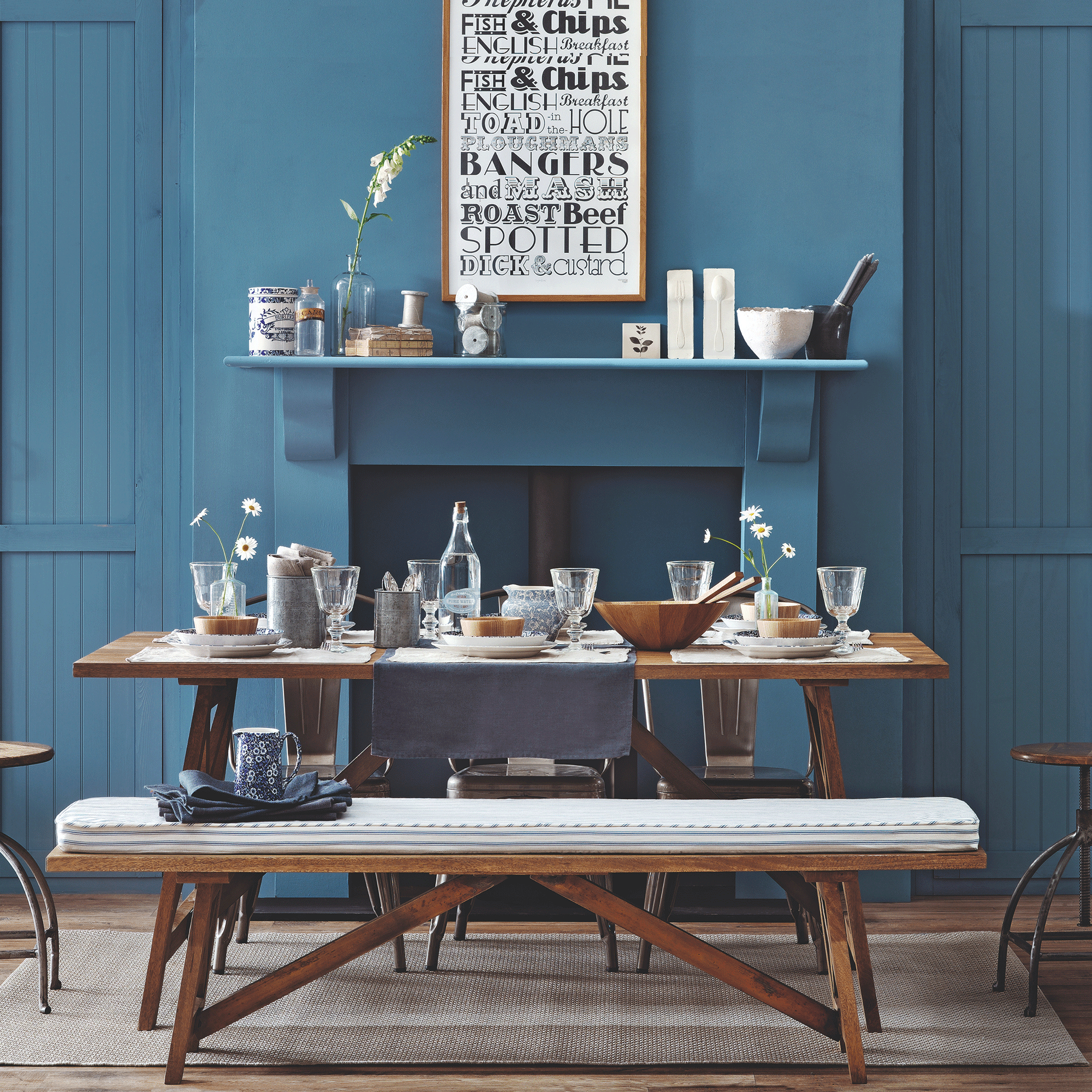
Painting a whole wall in one colour will give you an instant strong dining room colour scheme, and don’t just paint the walls, include any woodwork, even the fireplace in the decorating.
Blue is a good colour for a dining room as it’s calming, and if it doubles up as an office, studies show people are more productive in blue rooms. In a multi-purpose room choose furniture that is adaptable for different uses, here a combination of a bench, dining chairs and stools means they can be moved around easily and added to if more people arrive.
Sign up to our newsletter for style inspiration, real homes, project and garden advice and shopping know-how
2. Go for a bold colourful scheme
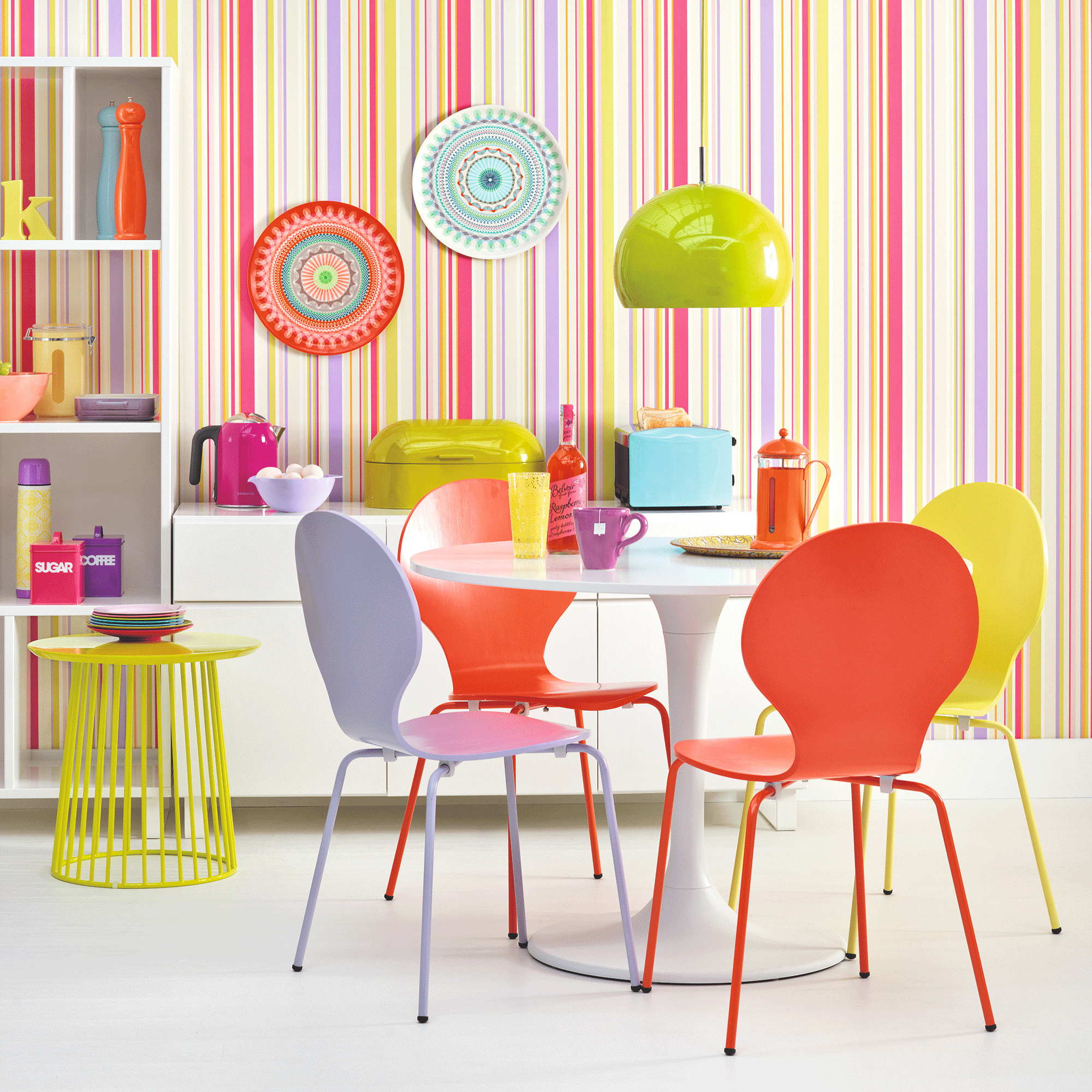
This might not be everybody’s cup of tea but it's a dining room wall decor idea that will certainly make you smile. This colourful scheme would work really well in a family kitchen diner. The striped wallpaper is the hero and the rest of the colour scheme bounces from that.
Keep the furniture – the table, shelving and sideboard neutral, here white has been chosen, to prevent the whole dining room colour scheme from being overpowering, then if you tire of the strong colours, it would be easy to change the wallpaper for something softer, or paint over it, and swap out the accessories for calmer shades, maybe in pastels for a completely different look.
‘Blue is the richest of colours, and historically the most expensive to produce and still, to this day, holds the same luxurious appeal and hypnotic allure. Never be afraid to use blue paint or wallpaper in a room.’ Says Ruth Mottershead, Creative Director of Little Greene. ‘Smart and stylish, it’s totally on-trend at the moment, dispelling the myth that blue is cold or masculine.
3. Pick a white for enduring style
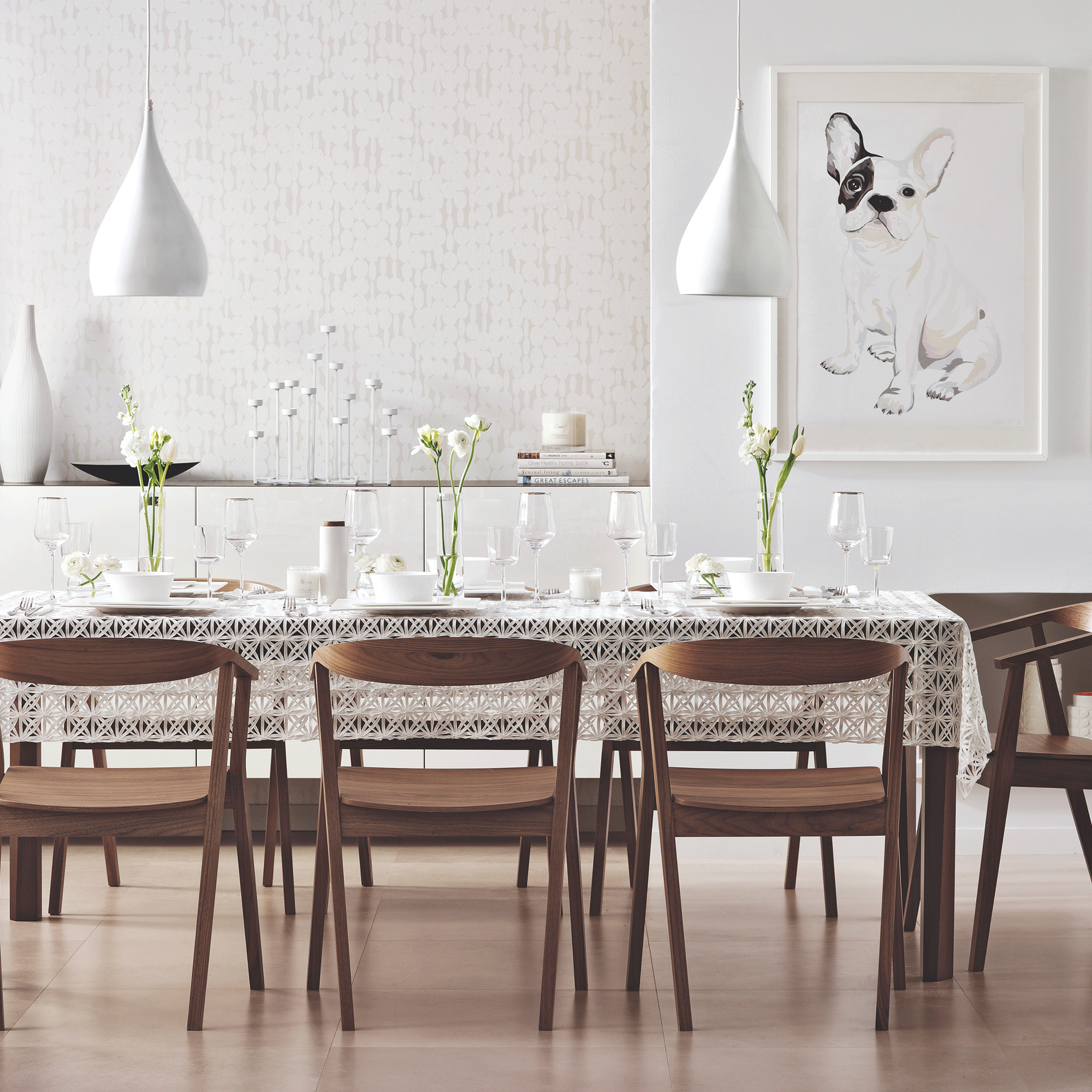
White painted walls give you a blank canvas to start from and it’s a calming, timeless colour. If you don’t want it to look too stark or cold, add in a subtle patterned wallpaper for interest or choose off-white or cream which are softer. Classic wooden furniture will never date so it’s an investment purchase and sustainable too.
Pendant lights will add light where you need it – over the table and again plain white china will never date. For special occasions, a tablecloth can be added, then personalise your space with art and accessories.
4. Introduce a green tonal palette
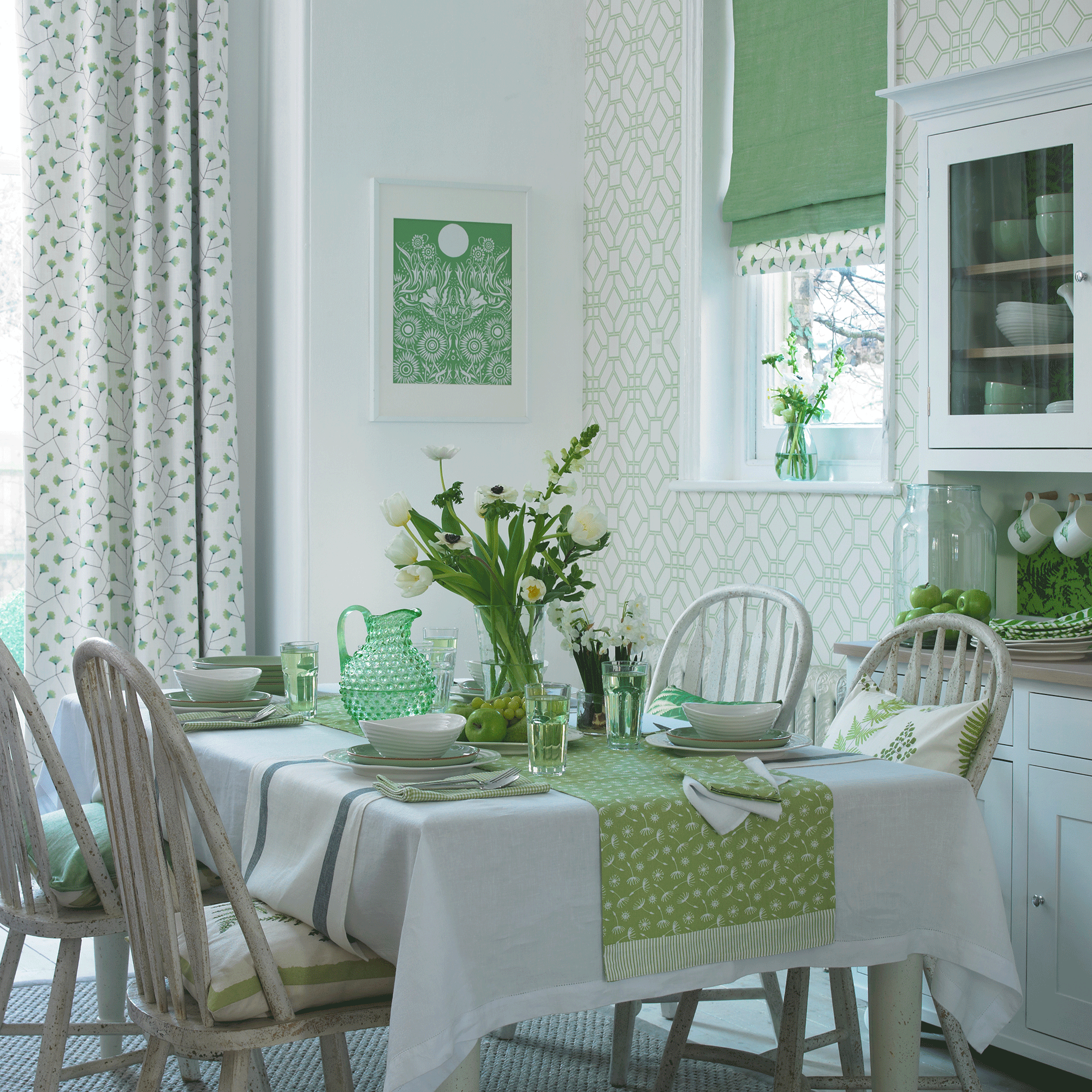
Using different patterns but in a similar shade of one colour means that the scheme works together as a whole creating a tonal scheme - nothing jars. Green is a popular choice for dining rooms as it is a calming tone, easy to live with and brings in a sense of the outdoors.
Here a feature wall has been created with a green and white wallpaper in a trellis pattern, teamed with a complementary leaf design in the curtain fabric. Other green shades have been introduced in the china, glasses, art prints and a tablecloth. It is fresh and spring-like.
‘Blue and green are both colours of nature and are helpful when creating a relaxing and welcoming space.’ Says Justyna Korczynska, Senior Designer at Crown Paints. ‘Green is the colour of the living environment, it evokes wellbeing and connects us with nature. Both of these colours, especially the softer shades are restful and harmonious and ideal for a dining room colour scheme.’
5. Use a focal point as the start of your colour scheme
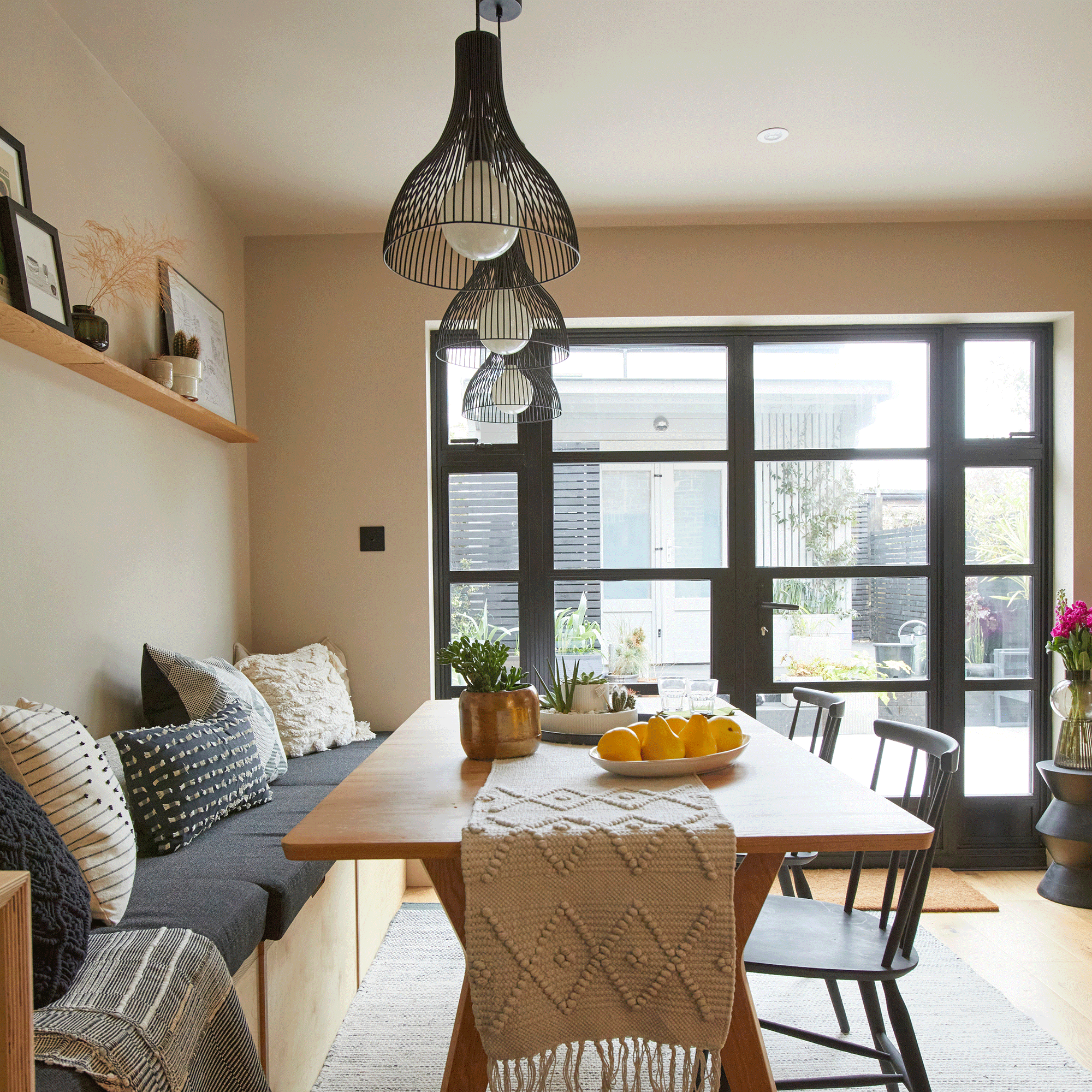
The focal point of this room are the graphic black doors leading into the garden, so use that as a starting point for your dining room colour scheme. Black works well with the warm neutral on the walls and charcoal cushions on the bench seating with black and cream cushions and black painted wooden chairs. A trio of black pendant lights draws your eye to the doors as does a high shelf used to display accessories.
6. Transform a compact space with monochrome
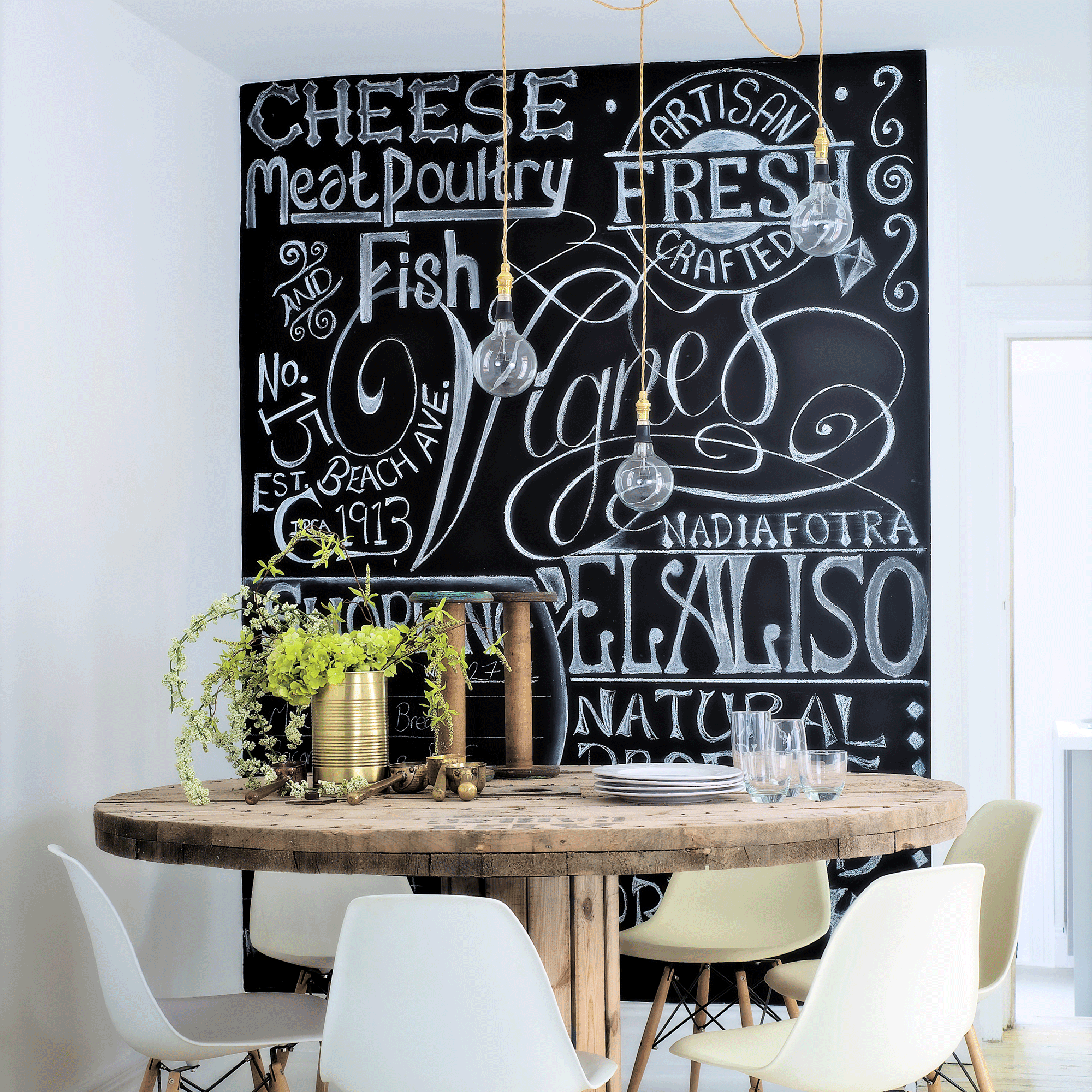
Corners of rooms make ideal spaces for small dining room ideas and round tables are the perfect solution for informal family meals. To keep the space simple and in keeping with wider open plan kitchen ideas, opt for a modern monochrome scheme.
The painted chalk board wall is the hero of this space. It is a playful twist on the timeless monochrome colour scheme. Simple white dining chairs tie the scheme together. However to stop this scheme from looking too cold add a pop of amber or gold to add a shot of warmth to the space.
7. Be led by your favourite wallpaper
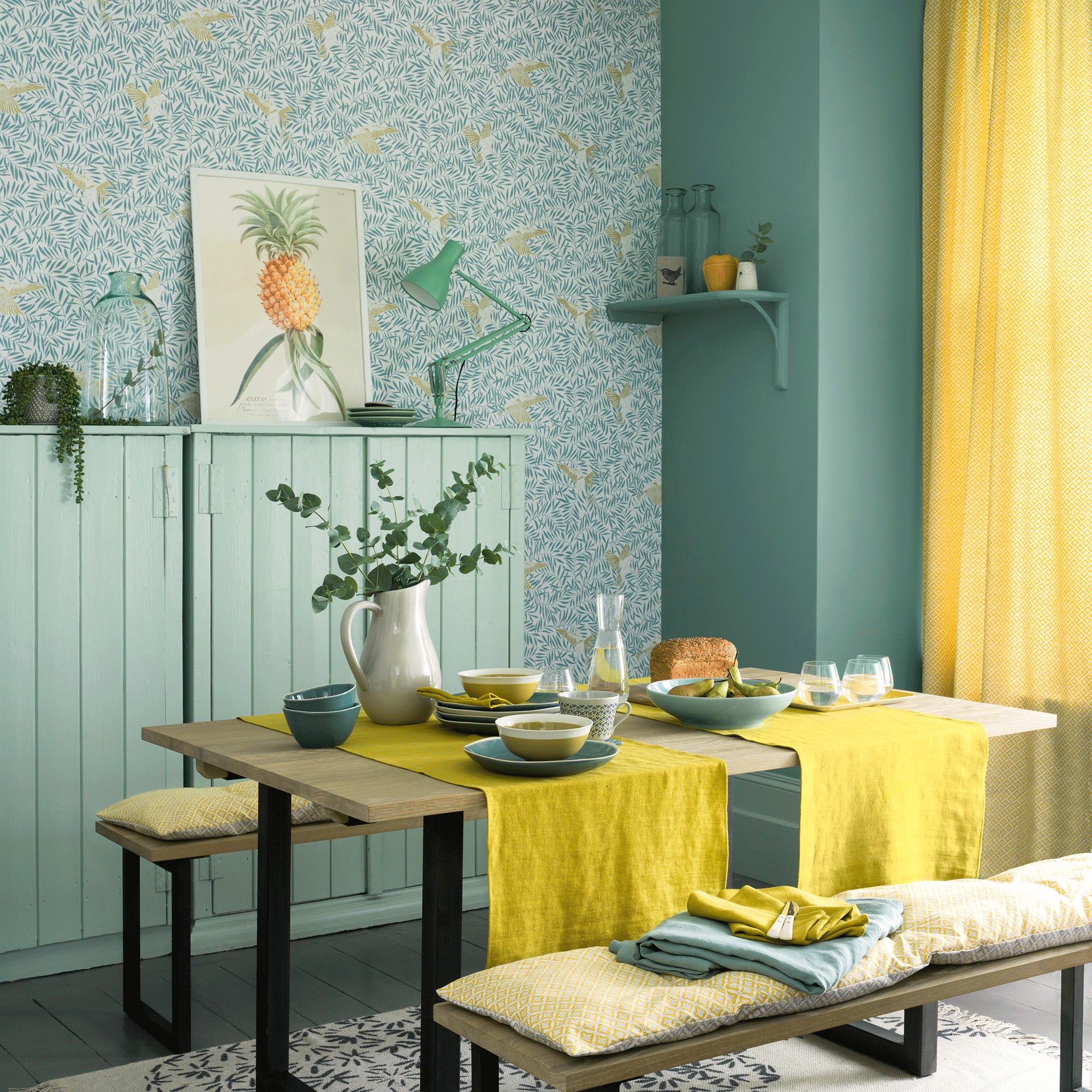
In a plain room, using a striking dining room wallpaper ideas as a feature on one wall adds interest and personality, and sets the tone for the space. Wallpaper is a great place to find inspiration for a dining room colour scheme, once you've found your favourite print, accentuate it by picking out colours from it on the surrounding walls. Complete the look with complementary coloured china and glasses on the table to pull the scheme together.
8. Work with the light to create a dramatic look
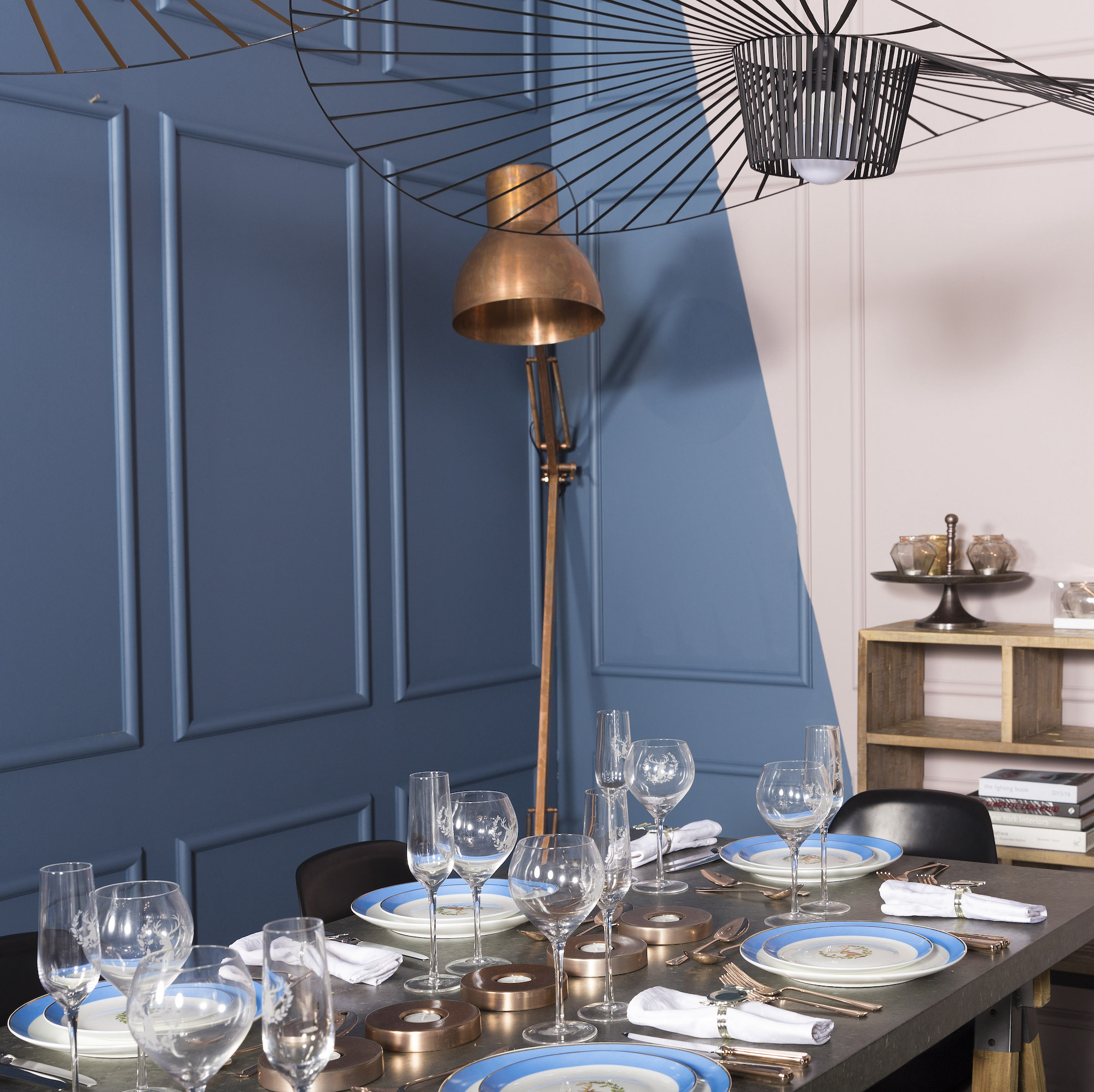
If your dining room has little or no natural light, work with the space to create a dark and dramatic look. Dark dining room paint ideas are sophisticated and elegant, ideal for a grown-up entertaining space.
Instead of fighting the gloomy feel, make it into a positive and choose dark furniture that will look glamorous then add metallics such as gold for a bewitching feel in lampshades, glassware and china.
9. Be inspired by nature
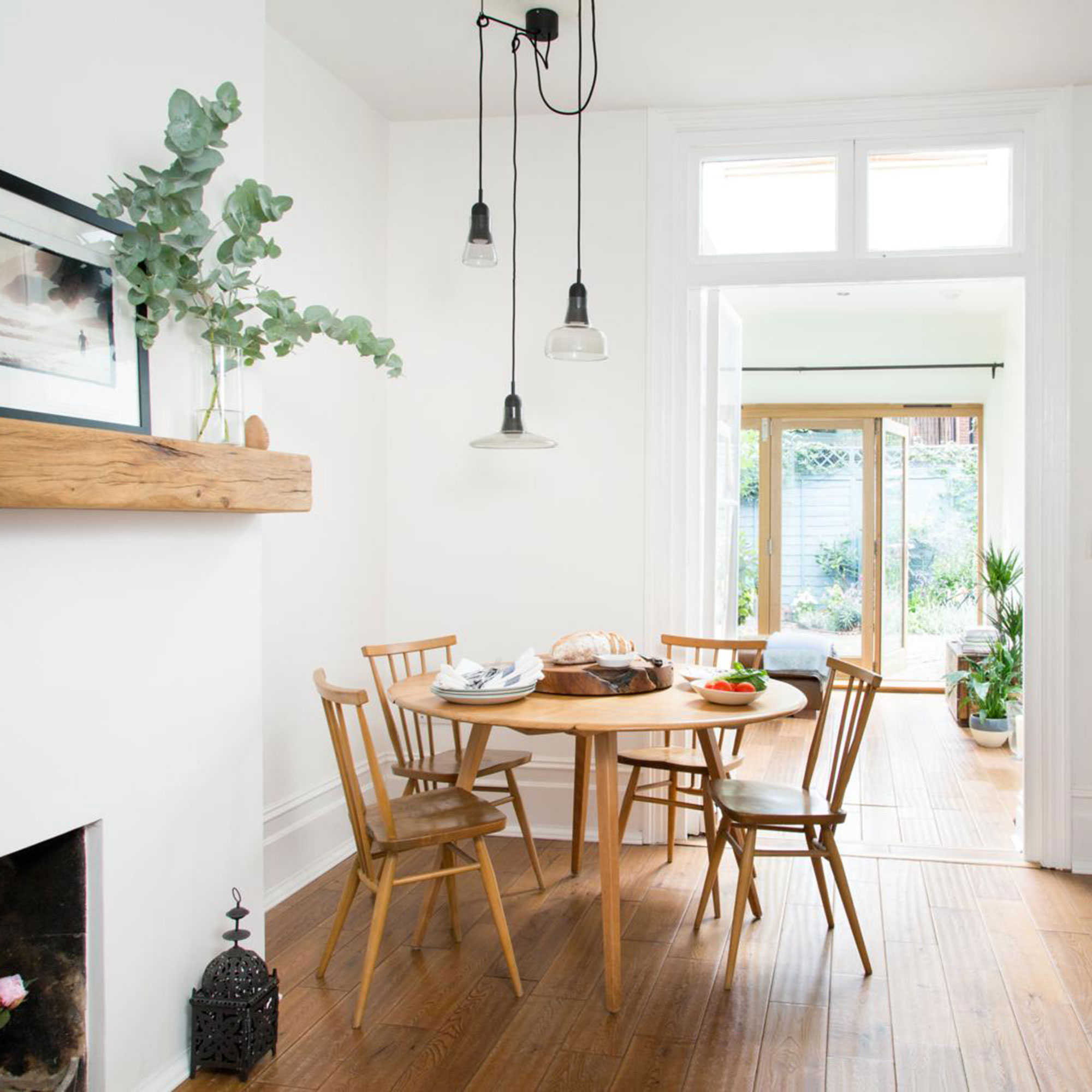
A dining colour scheme should always take into account what is outside a window, as much as what is inside.
If you're dining room looks out over the garden or is situated in a conservatory, think about introducing complementary greens and earthy tones into the dining room. Opt for wooden finishes, and introduce green into your scheme through houseplants rather than paint for an organic look.
10. Add drama with inky blues and black
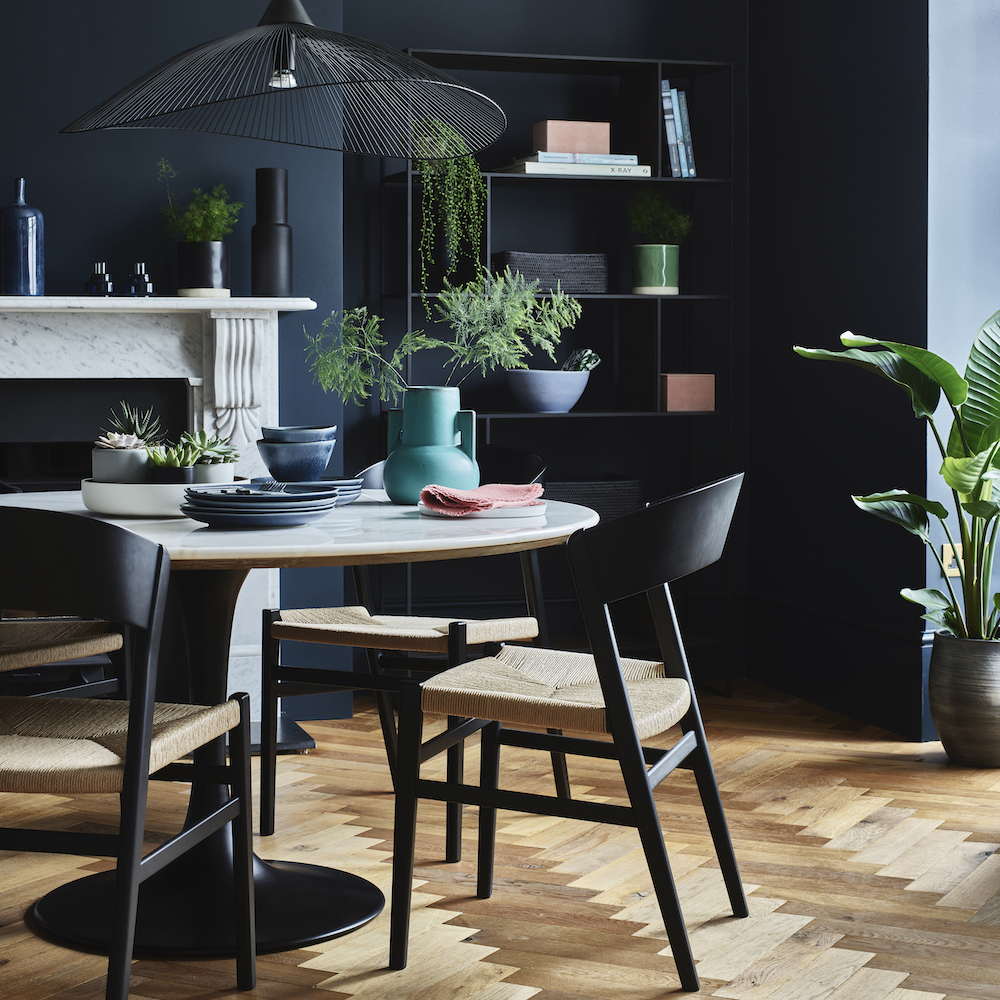
Stylist: Sarita Sharma)
The deep tones of a dark navy or black gives this room a smart and immersive feel, whilst the pale oak flooring, marble topped table and woven seats lifts the scheme and give it depth. The addition of turquoise and plaster pink accessories, together with plenty of faux foliage, keeps this dark decor feeling super fresh and contemporary.
11. Inject a pop of red into a neutral space
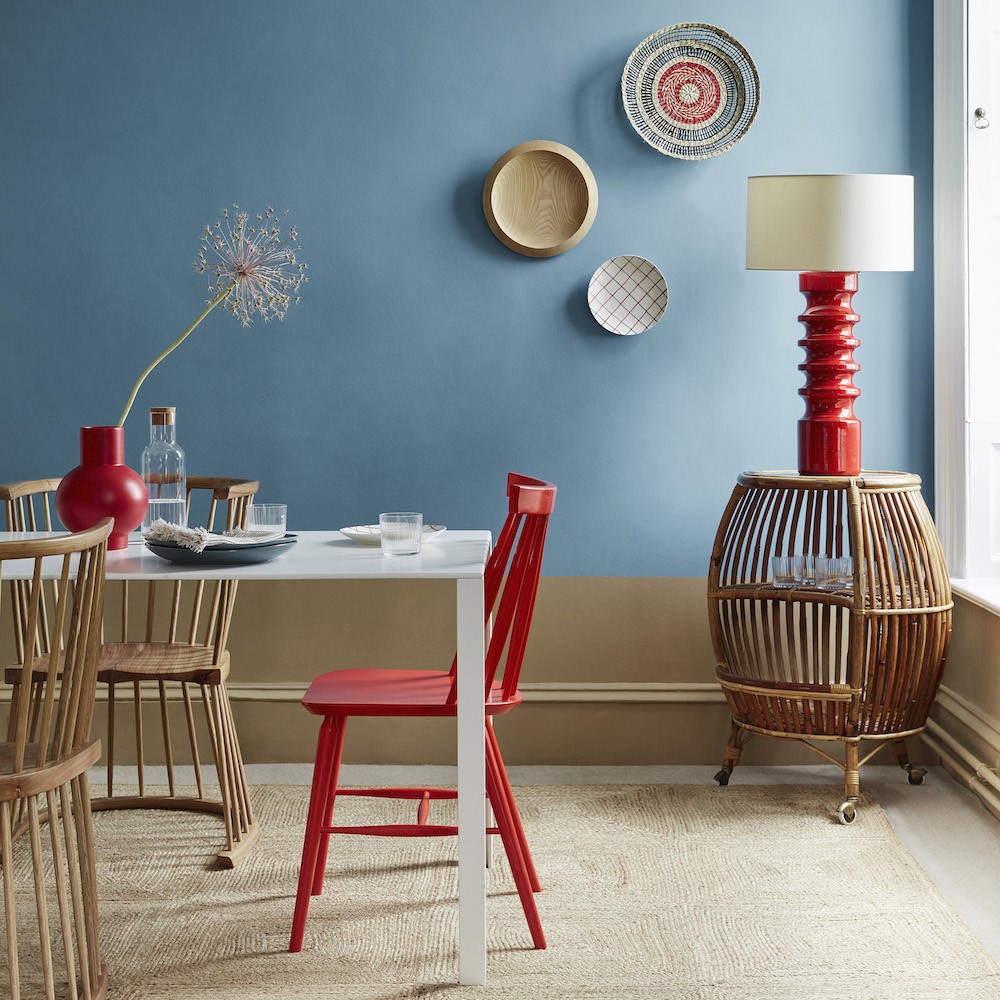
Transform a neutral palette by adding pops of primary brights. Using red accessories, such as lighting and vases, in different areas and corners of the room you will create pockets of interest that will lift the scheme. Choosing just the one highlight colour will provide more impact than having two or three.
12. Mix sugared almond tones
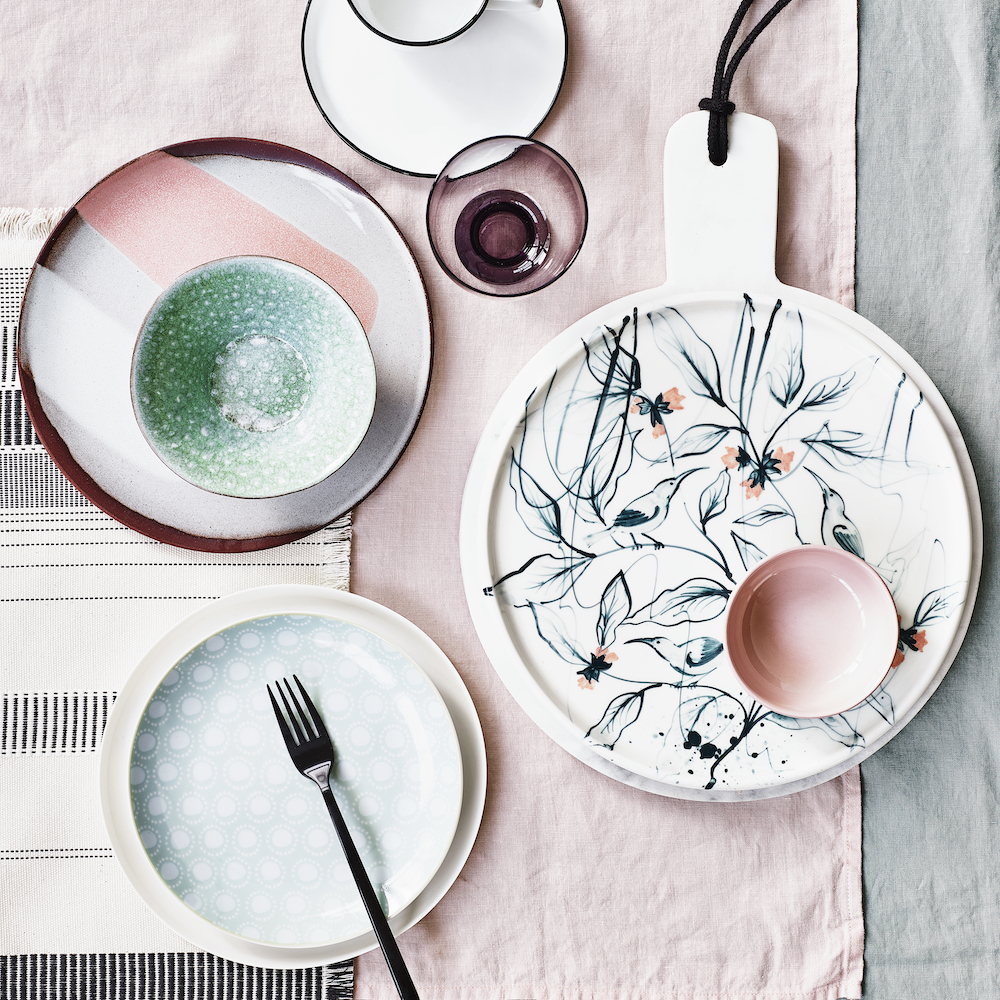
Stylist credit: Sally Denning)
Update your table with new colours and textures for spring. For an easy, relaxed look, choose a mix of patterns in a pastel palette of pale green, blue and blush pink. Look for designs that will work well together - a spot with a stripe, a floral with a plain for example.
13. Unify a multifunctional room
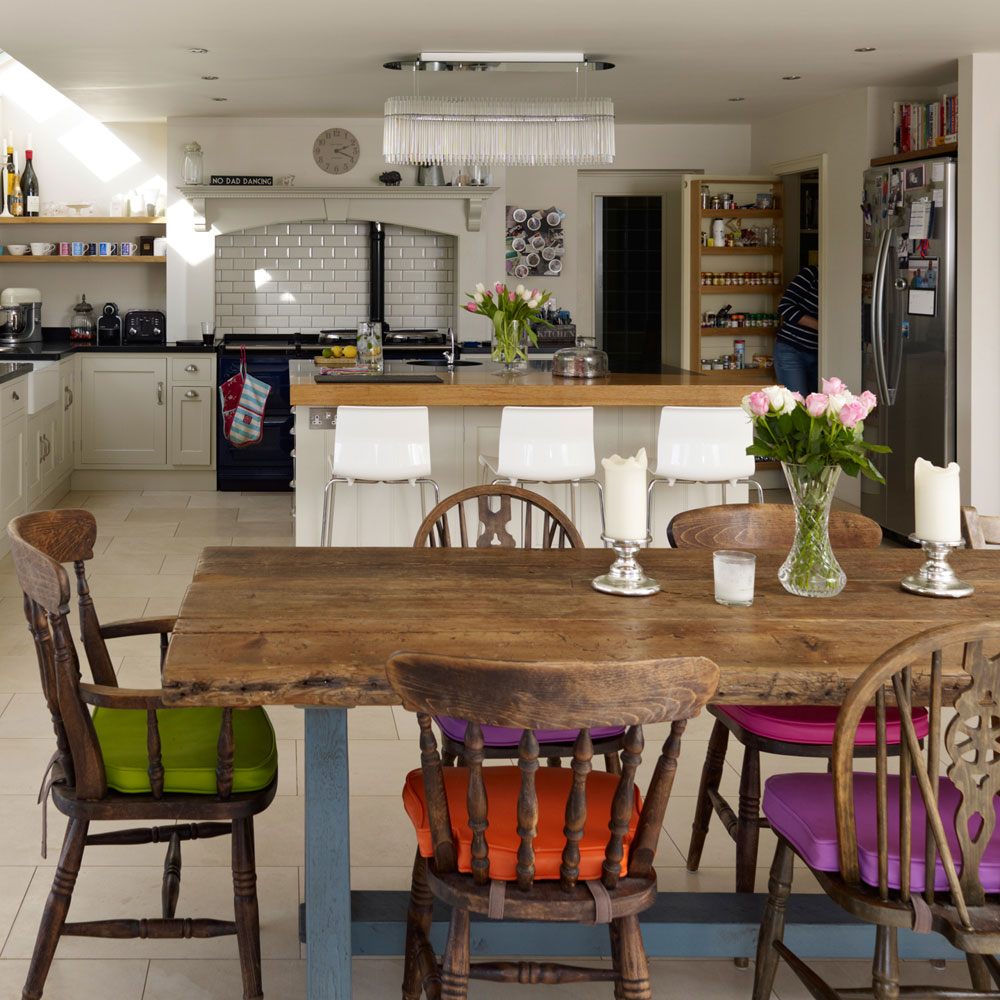
Co-ordinate a large open-plan room with a happy blend of colours. Start with a neutral backdrop throughout and add hits of colour across the scheme using soft furnishings.
Keep the practical kitchen a defining monochrome and then merge into cool subtle grey and pastels for a seating zone (this one benefits from an abundance of natural light). Finally, bring a reclaimed dining set back to life with co-ordinating seat pads in vibrant jewel tones for an uplifting eclectic finish that works.
14. Set the mood with mauve
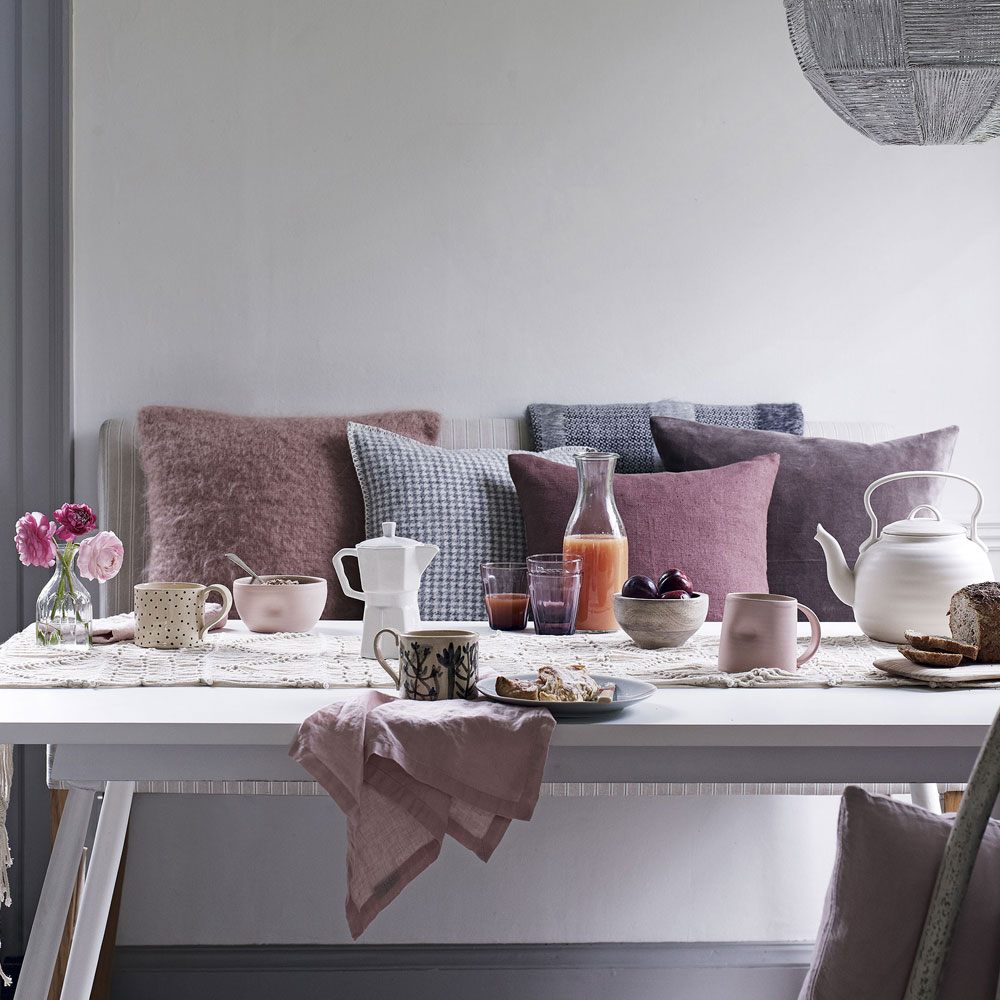
Pep up a breakfast table and bench with a laid-back palette of soft purples, pinks and greys. Warm up a neutral backdrop with a harmonious mix of stylish cushions of various textures in heather and ash tones to create a tranquil space.
Pretty up the table with a delicate crochet table runner and a mix of tableware in pastel shades to continue the relaxed vibe. A large chalky, woven light shade hung off centre creates an almost moonlit setting.
15. Go for green
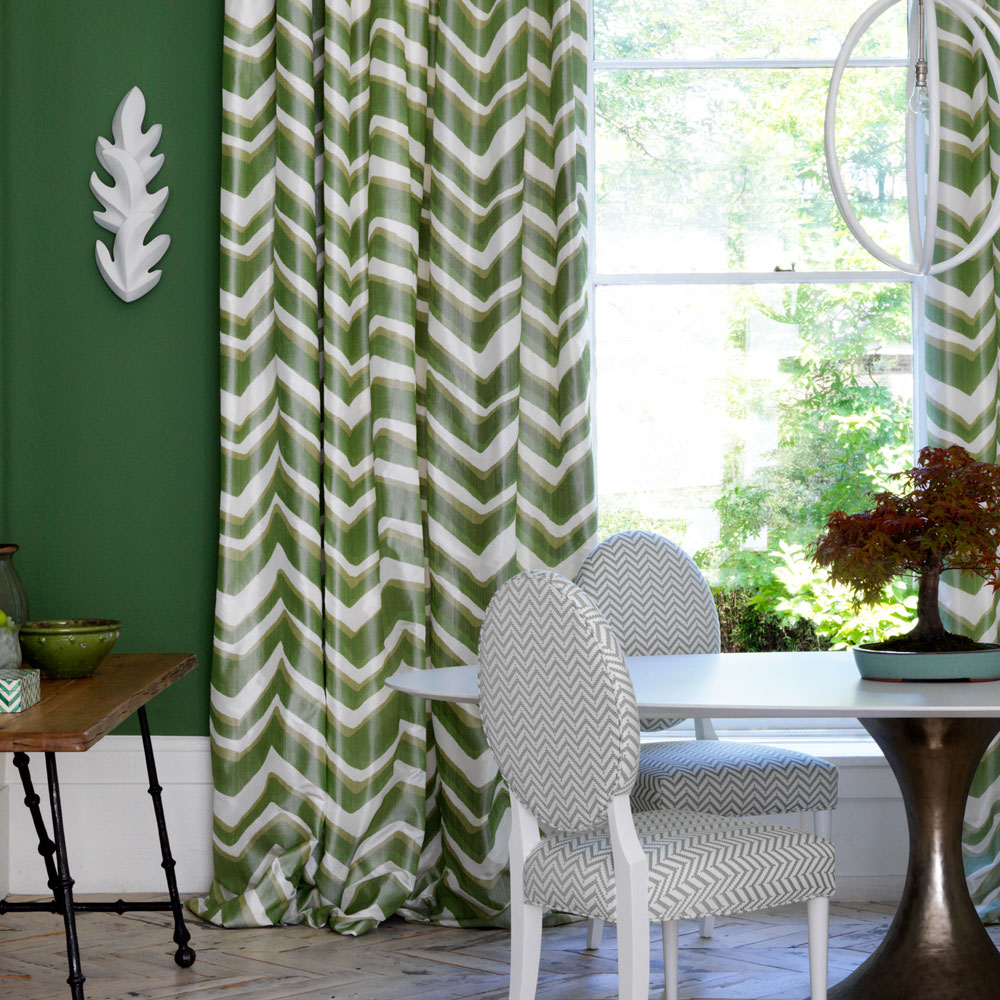
If your dining room overlooks the garden (or even if it doesn't), consider a green decorating scheme to bring a little of the outdoors in. Choose an uplifting vibrant shade and team it with modern pattern for a stimulating scheme. Offset the bold with refreshing white and pretty leaf motif accessories.
Use curtains to carry pattern - this loose chevron design in the same tone is an effective way of adding a refreshingly graphic edge while softening the bold colour choice.
16. Adjust the contrast
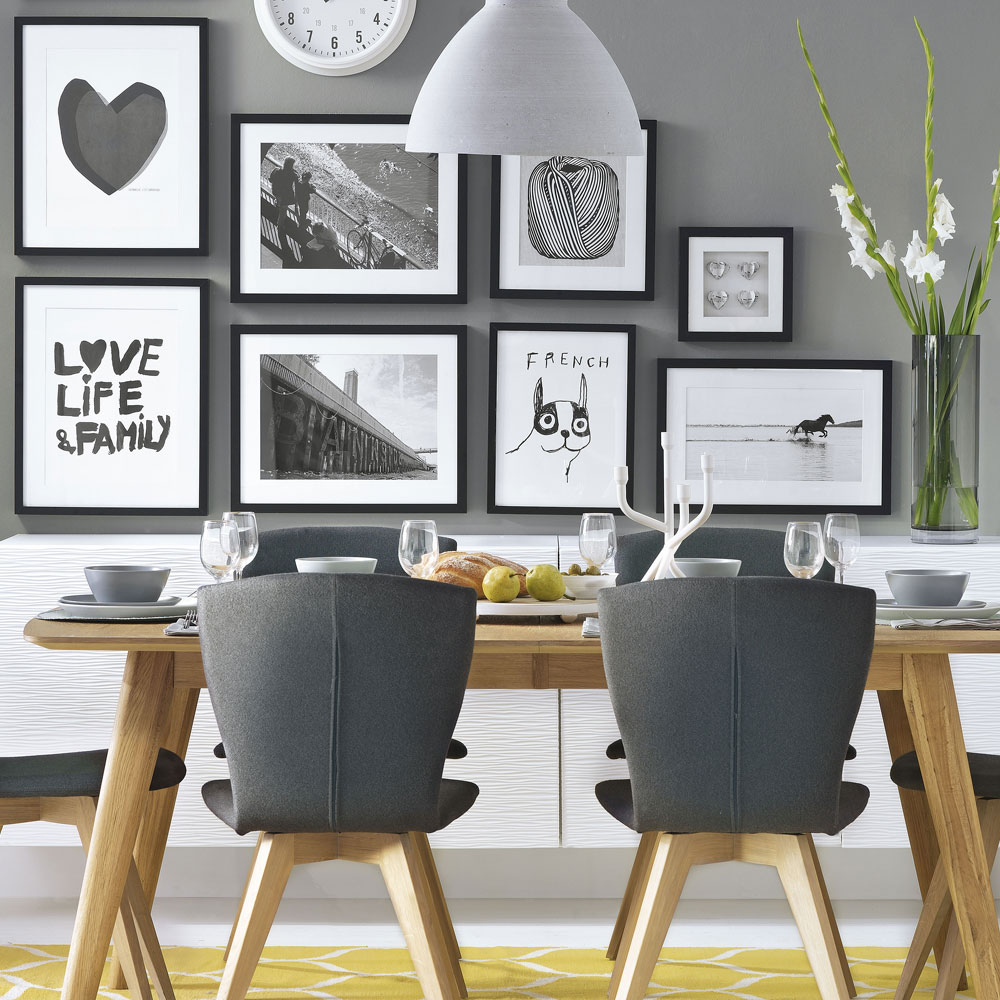
Get the best out of grey with monochrome additions. Take on the trend of the decade with a strong statement wall in slate grey. Break up the density with white storage to instantly freshen the mood.
Create depth and interest with a triangular display of arty black and white framed prints. Bring in pale wood dining furniture with smart grey upholstery and an exciting accent colour - such as the zingy yellow of this stylish rug.
17. Spin the colour wheel
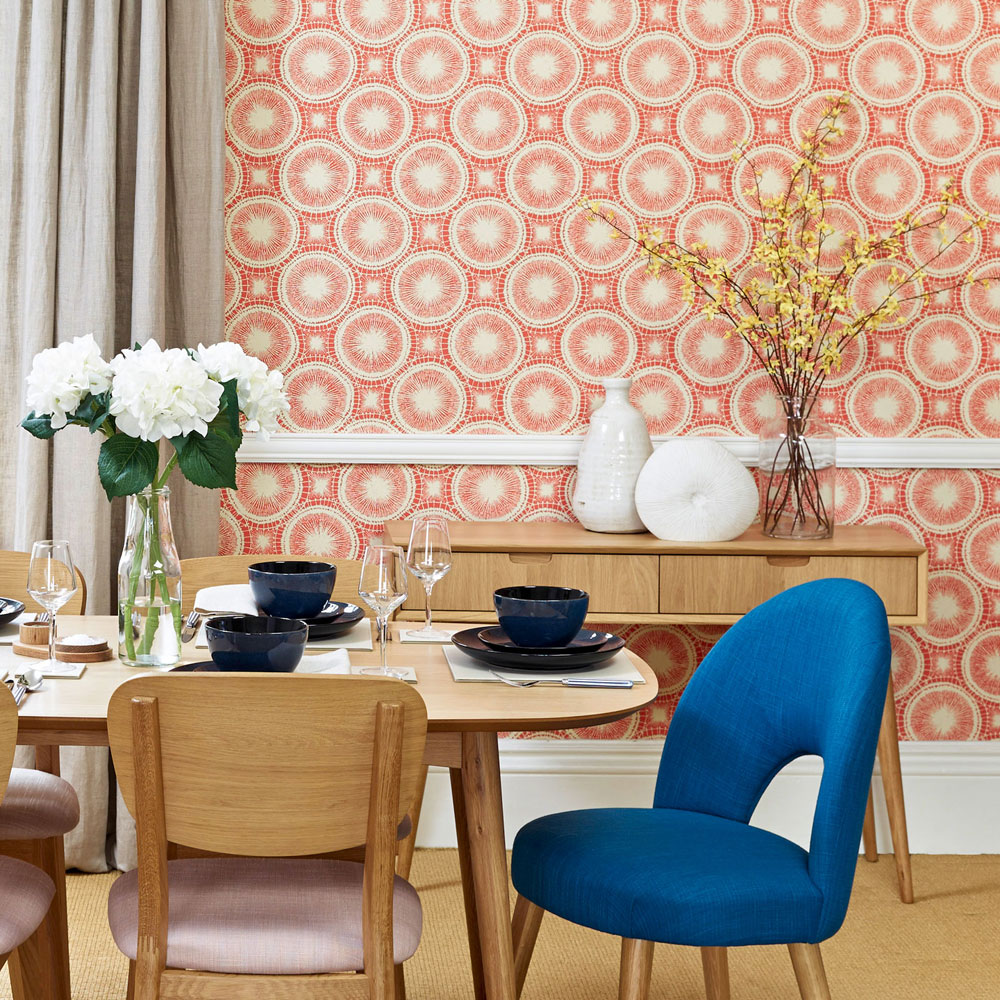
Choose complementary colours for a palette that’s pleasing to the eye. Vibrant orange will always pack a punch in a dining room, but introduce it through a circular motif wallpaper and the effect is all the more intense.
Counterbalance with blue tableware and a single velvet statement chair in cobalt to stand out and harmonise. Enhance the relaxed retro vibe with on-trend mid-century style furniture.
18. Use colour in isolation
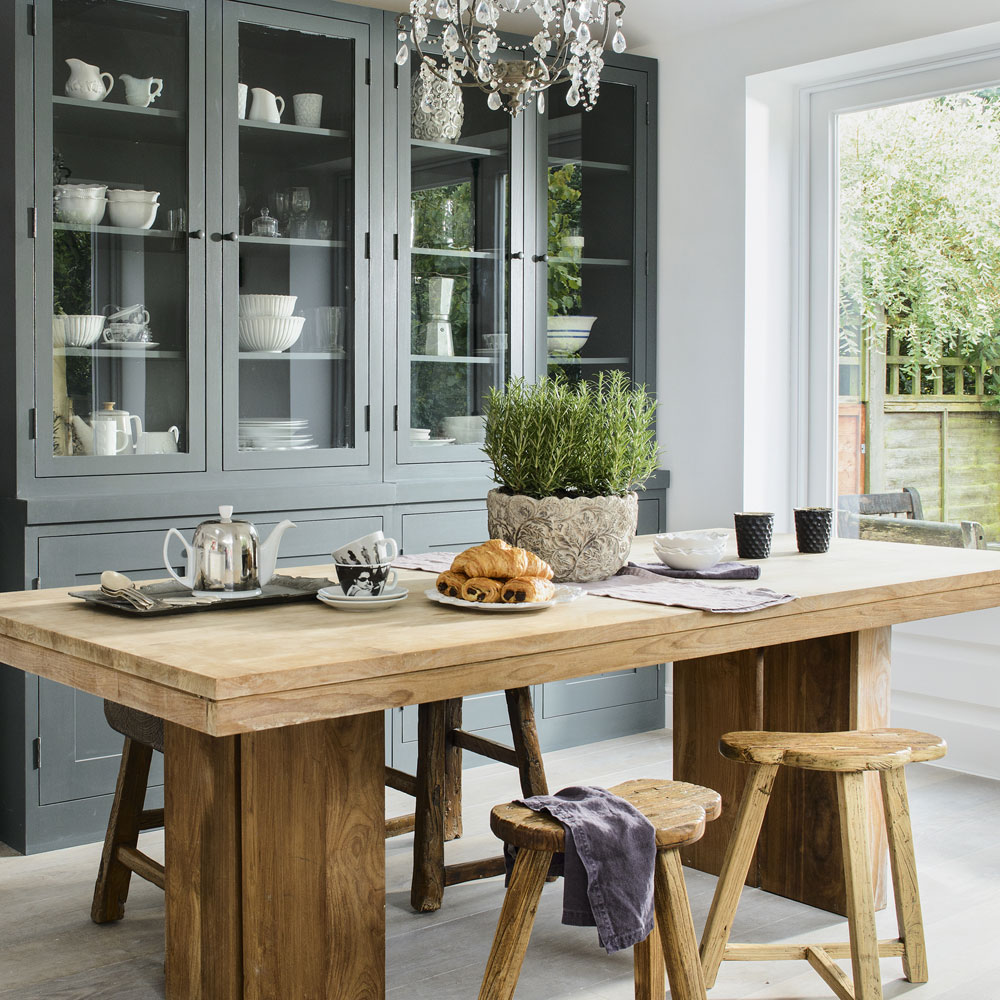
Paint a single cabinet a strong shade to stand out and create a cool, stylish atmosphere. Let an impressive and sturdy dresser dominate the dining space in stormy grey.
Choose rustic furniture in natural tones as a counterpoint to the intense paint colour. Hang a vintage chandelier for an air of luxury and keep the cabinet crockery pretty and co-ordinated with an all-white display.
19. Head for a red room
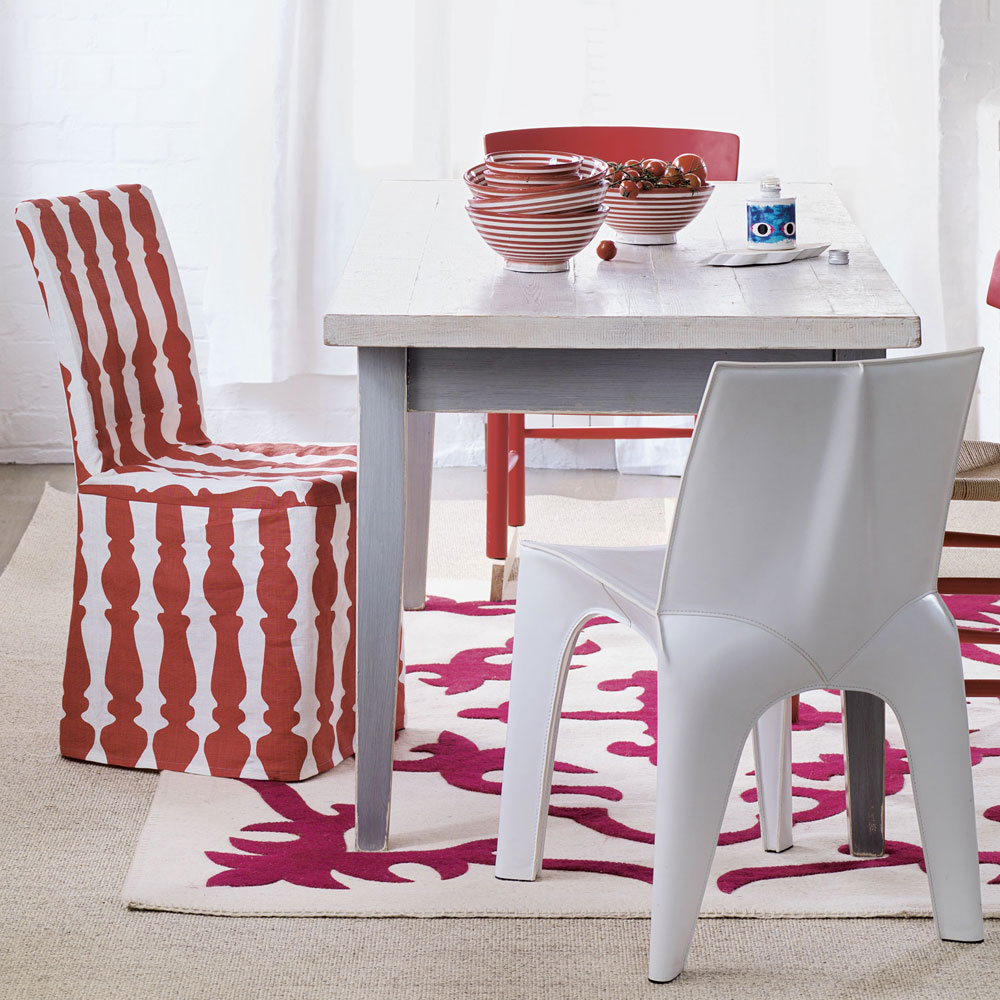
Nothing quite gets the attention like bright red - use it to accentuate an otherwise neutral dining room. Rather than drown a room with saturated colour, balance it throughout with an equal measure of white against a backdrop that's also white.
Start the style statement with an impressive low-slung light – this one conjures up a fiesta spirit with its pretty paper garlands. Echo the contemporary look with a mix of strong patterns on loose chair covers and a Nordic-style felt rug.
20. Perk up a dining room colour scheme with pattern
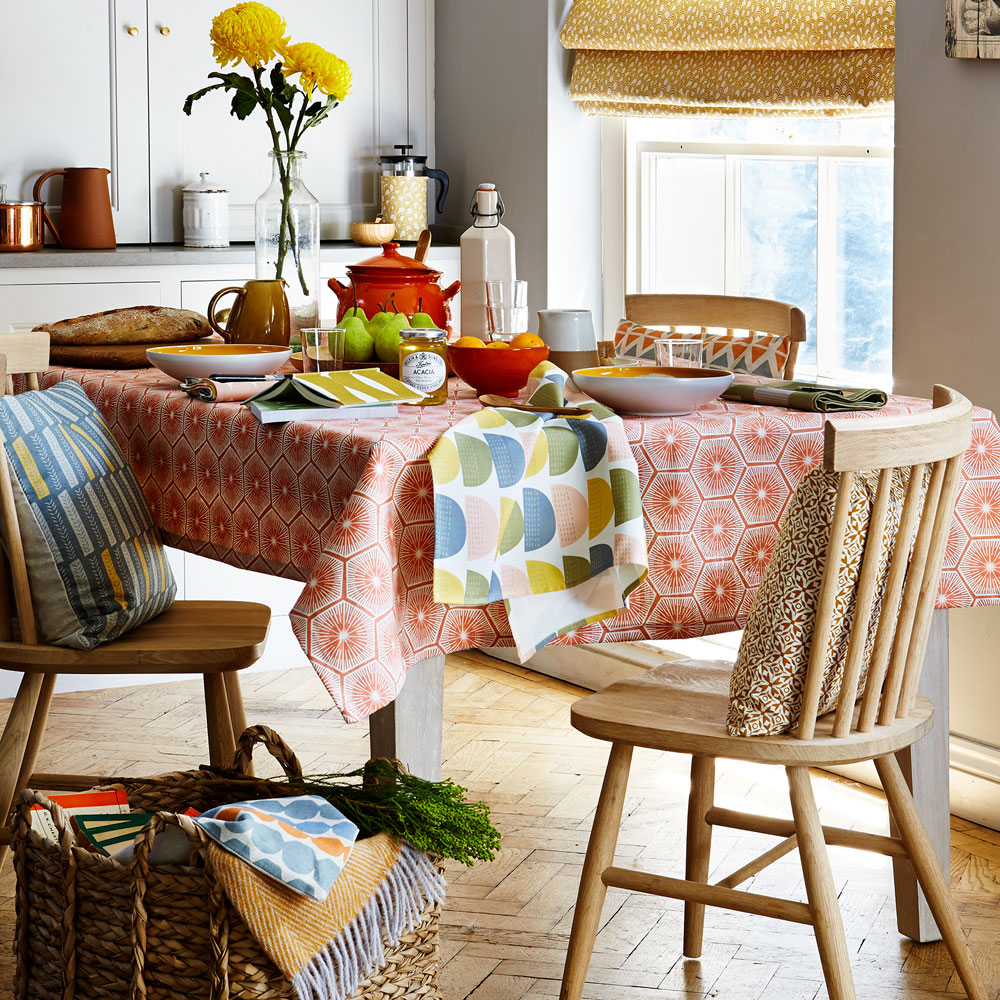
Warm up a rustic kitchen-diner with soft furnishings in a mix of disparate patterns and subtle autumnal colours to create a relaxed cottage feel. Mix warm tones that follows nature’s lead.
Anchor the look with a signature tablecloth featuring a geometric pattern in burnt umber, then draw in the seating with a mix of cushions in earthy tones and different designs. Emphasise the lived-in and busy with plenty of glazed ceramics and kitchen accessories. Here, an ochre Roman blind adds a burst of warming yellow.
21. Think pink
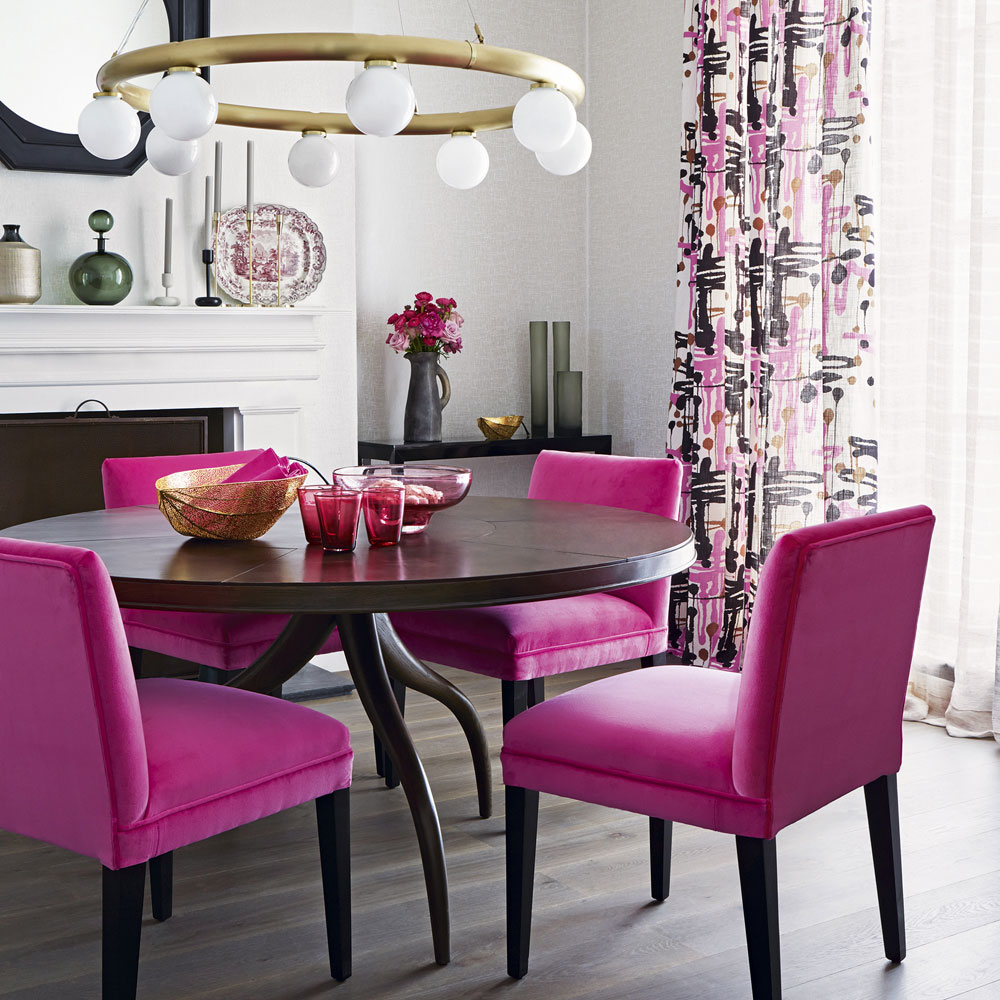
As general rule, the stronger the pink the less of it you need, so try a shot of shocking cerise with black and white to create a sophisticated look that's oozing with energy. Use white as the base as it sets off any pink to its best advantage. Introduce the explosion of colour with sumptuous velvet seating and vivid curtains. Team with black accents to take the look from girly to glam. An opulent orb pendant light will lean the look towards opulent 1950s Hollywood.
Will you be adding colour to your dining room? Be aware of the change of seasons -– intense wallpaper and fabric-covered chairs may be sumptuous and luxurious when it’s cold outside, but rather more intense in the summer heat.
Remember colour doesn’t have to be permanent, so consider more temporary updates to your dining room – a striking runner, chinaware and vases of seasonal blooms will not only inject colour into a neutral scheme, but can be a temporary reflection of summer brights or winter hues.
Which colour is better for a dining room?
There is no right or wrong when it comes to colour in a dining room. ‘Each home has its own individual character and taste,' says Helen Shaw, Benjamin Moore Paints UK Director.
‘However when deciding on the colour of a room, it’s important to consider what the room is going to be used for and how you want people to feel in that room. For a dining room, it’s a sociable space where you want to entertain guests, so opting for a bold, rich colour can make a statement yet also transform easily into a cosy, intimate area, especially with the right lighting’
Should the dining room be the same colour as the living room?
There are no hard and fast rules around this, after all its your home and it should be decorated the way you want it. ‘To keep a balanced and harmonious feel throughout the rooms, if they are separate, keep to one or two accent colours to keep the overall look consistent,' says Emma Deterding, Founder and Creative Director of Kelling Designs and KD Loves.
‘In an open-plan space, it’s definitely worth keeping the scheme cohesive by sticking to complementary colours throughout the space, but you can create some division and zoning by adding pops of colour to each area, so there is a subtle definition between the two spaces.’
Should your kitchen and dining room match?
‘Your kitchen and dining room are both undoubtedly food-focused places but they are as different as a study and a bedroom,' says Marianne Shillingford, Creative Director of Dulux.
‘One is for working and the other relaxing. You need to think about the mood you are in when you are cooking. Are you calm and happy, or do you feel stressed? Reds might stimulate the appetite but they can also raise the blood pressure, so if you want to be more chilled in the kitchen, consider a more tranquil colour such as blue, green or use warm neutrals and then add dollops of delicious red in the details and accessories. Then you could choose reds or spice tones in the dining room which will create a sophisticated look’
Jennifer is the Deputy Editor (Digital) for Homes & Gardens online. Prior to her current position, she completed various short courses a KLC Design School, and wrote across sister brands Ideal Home, LivingEtc, 25 Beautiful Homes, Country Homes & Interiors, and Style at Home.